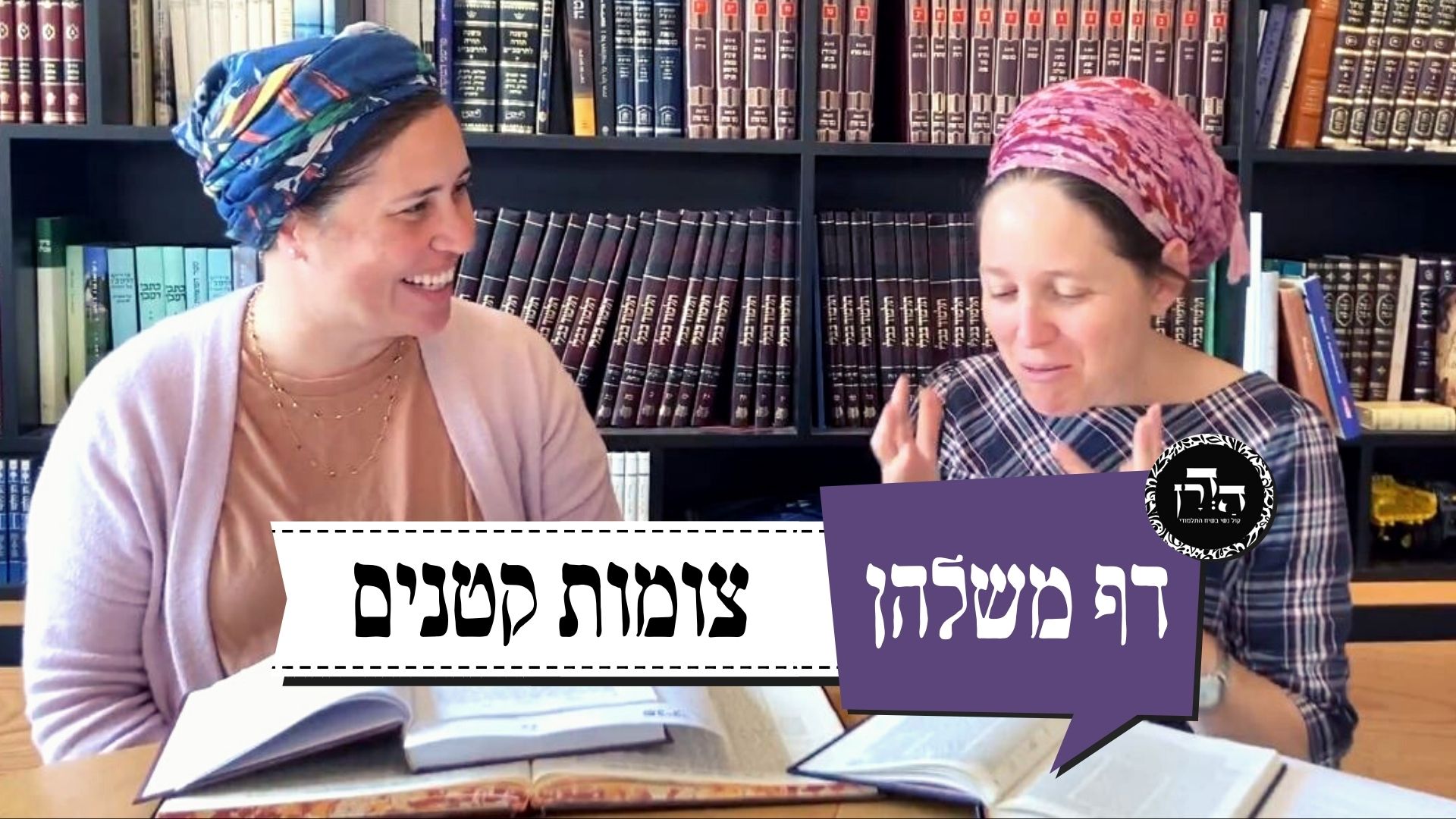ראש השנה ב
אַרְבָּעָה רָאשֵׁי שָׁנִים הֵם, בְּאֶחָד בְּנִיסָן — רֹאשׁ הַשָּׁנָה לַמְּלָכִים וְלָרְגָלִים.
MISHNA: They are four days in the year that serve as the New Year, each for a different purpose: On the first of Nisan is the New Year for kings; it is from this date that the years of a king’s rule are counted. And the first of Nisan is also the New Year for the order of the Festivals, as it determines which is considered the first Festival of the year and which the last.
בְּאֶחָד בֶּאֱלוּל — רֹאשׁ הַשָּׁנָה לְמַעְשַׂר בְּהֵמָה. רַבִּי אֶלְעָזָר וְרַבִּי שִׁמְעוֹן אוֹמְרִים: בְּאֶחָד בְּתִשְׁרִי.
On the first of Elul is the New Year for animal tithes; all the animals born prior to that date belong to the previous tithe year and are tithed as a single unit, whereas those born after that date belong to the next tithe year. Rabbi Elazar and Rabbi Shimon say: The New Year for animal tithes is on the first of Tishrei.
בְּאֶחָד בְּתִשְׁרִי — רֹאשׁ הַשָּׁנָה לַשָּׁנִים וְלַשְּׁמִיטִּין וְלַיּוֹבְלוֹת, לִנְטִיעָה וְלִירָקוֹת.
On the first of Tishrei is the New Year for counting years, as will be explained in the Gemara; for calculating Sabbatical Years and Jubilee Years, i.e., from the first of Tishrei there is a biblical prohibition to work the land during these years; for planting, for determining the years of orla, the three-year period from when a tree has been planted during which time its fruit is forbidden; and for tithing vegetables, as vegetables picked prior to that date cannot be tithed together with vegetables picked after that date.
בְּאֶחָד בִּשְׁבָט — רֹאשׁ הַשָּׁנָה לָאִילָן כְּדִבְרֵי בֵּית שַׁמַּאי. בֵּית הִלֵּל אוֹמְרִים: בַּחֲמִשָּׁה עָשָׂר בּוֹ.
On the first of Shevat is the New Year for the tree; the fruit of a tree that was formed prior to that date belong to the previous tithe year and cannot be tithed together with fruit that was formed after that date; this ruling is in accordance with the statement of Beit Shammai. But Beit Hillel say: The New Year for trees is on the fifteenth of Shevat.
גְּמָ׳ לַמְּלָכִים, לְמַאי הִלְכְתָא? אָמַר רַב חִסְדָּא: לִשְׁטָרוֹת.
GEMARA: The New Year for kings; with regard to what halakha is it mentioned in the mishna? Why is it necessary to set a specific date to count the years of a king’s rule, rather than counting them from the day that he ascends to the throne? Rav Ḥisda said: It is for determining the validity of documents.
דִּתְנַן: שִׁטְרֵי חוֹב הַמּוּקְדָּמִין — פְּסוּלִין, וְהַמְאוּחָרִין — כְּשֵׁרִין.
It was the common practice to date documents in accordance with the years of the king’s rule; therefore, it was important that these years begin at a fixed time, so that one knows whether a particular document was antedated or postdated, as we learned in a mishna: Antedated promissory notes, i.e., promissory notes dated prior to the date on which the loan actually took place, are invalid because a loan document creates a lien on the borrower’s property. By dating the document earlier than the loan itself, the lender has a fraudulent mortgage on the property, which can be used against any future purchaser. Therefore, the Sages ordained that an antedated promissory note does not establish a lien, even from the true date of the loan. But postdated promissory notes bearing a date that is later than the date when the loan actually took place are valid, as postdating the note presents no opportunity for defrauding a purchaser.
תָּנוּ רַבָּנַן: מֶלֶךְ שֶׁעָמַד בְּעֶשְׂרִים וְתִשְׁעָה בַּאֲדָר, כֵּיוָן שֶׁהִגִּיעַ אֶחָד בְּנִיסָן — עָלְתָה לוֹ שָׁנָה. וְאִם לֹא עָמַד אֶלָּא בְּאֶחָד בְּנִיסָן — אֵין מוֹנִין לוֹ שָׁנָה עַד שֶׁיַּגִּיעַ נִיסָן אַחֵר.
The Sages taught in a baraita: If a king ascended to the throne on the twenty-ninth of Adar, the month preceding Nisan, once the first of Nisan arrives, although he reigned for only one day, a year is counted toward his reign; his first year of rule is completed from the first of Nisan. But if he ascended to the throne only on the first of Nisan, one counts an additional year toward his reign only when the next Nisan arrives.
אָמַר מָר: מֶלֶךְ שֶׁעָמַד בְּעֶשְׂרִים וְתִשְׁעָה בַּאֲדָר, כֵּיוָן שֶׁהִגִּיעַ אֶחָד בְּנִיסָן — עָלְתָה לוֹ שָׁנָה. הָא
The Master said, citing the baraita: If a king ascended to the throne on the twenty-ninth of Adar, once the first of Nisan arrives a year is counted toward his reign. The Gemara comments: This
קָא מַשְׁמַע לַן דְּנִיסָן רֹאשׁ הַשָּׁנָה לִמְלָכִים, וְיוֹם אֶחָד בַּשָּׁנָה חָשׁוּב שָׁנָה. וְאִם לֹא עָמַד אֶלָּא בְּאֶחָד בְּנִיסָן, אֵין מוֹנִין לוֹ שָׁנָה עַד שֶׁיַּגִּיעַ נִיסָן אַחֵר. פְּשִׁיטָא!
teaches us that Nisan is the New Year for kings, and it also teaches us that one day in a year is considered a year; although this king ruled for only one day, a full year is counted toward his reign. The Gemara asks: Consider the next clause of the baraita: But if he ascended to the throne only on the first of Nisan, a year is not counted toward his reign until the next first of Nisan arrives. Isn’t this obvious?
לָא צְרִיכָא, דְּאִימְּנוֹ עֲלֵיהּ מֵאֲדָר. מַהוּ דְּתֵימָא, נִימְנוֹ לֵיהּ תַּרְתֵּין שְׁנִין, קָא מַשְׁמַע לַן.
The Gemara explains: No, it is necessary for a case where the princes agreed to appoint him as king already in the month of Adar. Lest you say that since the decision to appoint him king was made already in Adar, once the first of Nisan arrives they should count it the second year of his reign, therefore the baraita teaches us that the count begins only from when he actually began his rule.
תָּנוּ רַבָּנַן: מֵת בַּאֲדָר וְעָמַד אַחֵר תַּחְתָּיו בַּאֲדָר — מוֹנִין שָׁנָה לְזֶה וְלָזֶה. מֵת בְּנִיסָן וְעָמַד אַחֵר תַּחְתָּיו בְּנִיסָן — מוֹנִין שָׁנָה לְזֶה וְלָזֶה. מֵת בַּאֲדָר וְעָמַד אַחֵר תַּחְתָּיו בְּנִיסָן — מוֹנִין רִאשׁוֹנָה לָרִאשׁוֹן, וּשְׁנִיָּה לַשֵּׁנִי.
§ The Sages taught in a baraita: If the king died in the month of Adar and another king succeeded him to the throne in that same Adar, one counts the year to this one, i.e., the previous king, as his final year, and to that one, i.e., the new king who began his reign in Adar. If the first king died in the month of Nisan and another king succeeded him in that same Nisan, one counts the year to this one, the previous king, and to that one, the new king. But if the first king died in Adar and another king succeeded him in Nisan, one counts the first year to the first king as his final year, and the second year to the second king as the first year of his reign.
אָמַר מַר: מֵת בַּאֲדָר וְעָמַד אַחֵר תַּחְתָּיו בַּאֲדָר — מוֹנִין שָׁנָה לְזֶה וְלָזֶה. פְּשִׁיטָא! מַהוּ דְּתֵימָא: שַׁתָּא לְבֵי תְרֵי לָא מָנִינַן, קָא מַשְׁמַע לַן.
The Master said: If the king died in Adar and another king succeeded him to the throne in that same Adar, one counts the year to this one, i.e., the previous king, as his final year, and to that one, i.e., the new king, as the first year of his reign. The Gemara asks: Isn’t this obvious? The Gemara explains: Lest you say that one year cannot be counted toward two kings, and so the entire year should be counted only toward the previous king, the baraita therefore teaches us that the years of two kings can overlap and be counted in a single year.
מֵת בְּנִיסָן וְעָמַד אַחֵר תַּחְתָּיו בְּנִיסָן — מוֹנִין שָׁנָה לְזֶה וְלָזֶה. פְּשִׁיטָא! מַהוּ דְּתֵימָא: כִּי אָמְרִינַן יוֹם אֶחָד בַּשָּׁנָה חָשׁוּב שָׁנָה — בְּסוֹף שָׁנָה. אֲבָל בִּתְחִלַּת שָׁנָה — לָא אָמְרִינַן, קָא מַשְׁמַע לַן.
The Gemara cites the next phrase of the baraita: If the first king died in Nisan and another king succeeded him in that same Nisan, one counts the year to this one, the previous king, and to that one, the new king. The Gemara asks: Isn’t this obvious? The Gemara explains: Lest you say that when we say that one day in a year is considered a full year, this only applies when the day is at the end of the year, i.e., since his reign will continue in the coming year the day is considered like a whole year, but if the day is at the beginning of the year we should not say that the beginning of Nisan is counted as another year for the previous king; therefore, it teaches us that there is no such a distinction.
מֵת בַּאֲדָר וְעָמַד אַחֵר תַּחְתָּיו בְּנִיסָן — מוֹנִין רִאשׁוֹנָה לָרִאשׁוֹן וּשְׁנִיָּה לַשֵּׁנִי. פְּשִׁיטָא! לָא צְרִיכָא, דְּאִימְּנוֹ עֲלֵיהּ מֵאֲדָר, וּמֶלֶךְ בֶּן מֶלֶךְ הוּא, מַהוּ דְּתֵימָא: נִימְנוֹ לֵיהּ תַּרְתֵּין שְׁנִין, קָא מַשְׁמַע לַן.
It was further taught in the baraita: But if the first king died in Adar and another king succeeded him in Nisan, one counts the first year to the first king as his final year, and the second year to the second king as the first year of his reign. The Gemara asks: Isn’t this obvious? The Gemara explains: No, it is necessary for a case where the princes decided to appoint him as king in Adar, and he is also a king, son of the previous king, so that his succession to the throne is automatic. Lest you say that by the time the first of Nisan arrives, two years should be counted toward his reign, it therefore teaches us that one counts only from Nisan, when he actually succeeded his father to the throne.
אָמַר רַבִּי יוֹחָנָן: מִנַּיִן לַמְּלָכִים שֶׁאֵין מוֹנִין לָהֶם אֶלָּא מִנִּיסָן — שֶׁנֶּאֱמַר: ״וַיְהִי בִשְׁמוֹנִים שָׁנָה וְאַרְבַּע מֵאוֹת שָׁנָה לְצֵאת בְּנֵי יִשְׂרָאֵל מֵאֶרֶץ מִצְרַיִם בַּשָּׁנָה הָרְבִיעִית בְּחֹדֶשׁ זִיו הוּא הַחֹדֶשׁ הַשֵּׁנִי לִמְלֹךְ שְׁלֹמֹה עַל יִשְׂרָאֵל״. מַקִּישׁ מַלְכוּת שְׁלֹמֹה לִיצִיאַת מִצְרַיִם: מָה יְצִיאַת מִצְרַיִם מִנִּיסָן — אַף מַלְכוּת שְׁלֹמֹה מִנִּיסָן.
§ Rabbi Yoḥanan said: From where is it derived that one counts the years of kings’ reigns only from Nisan? As it is stated: “And it came to pass in the four hundred and eightieth year after the children of Israel were come out of the land of Egypt, in the fourth year of Solomon’s reign over Israel, in the month Ziv, which is the second month, that he began to build the house of the Lord” (I Kings 6:1). This verse juxtaposes the reign of Solomon to the exodus from Egypt: Just as one counts the years since the exodus from Egypt from Nisan, when the Jewish people left Egypt, so too, one counts the years of Solomon’s reign from Nisan.
וִיצִיאַת מִצְרַיִם גּוּפַהּ מְנָלַן דְּמִנִּיסָן מָנִינַן? דִּילְמָא מִתִּשְׁרִי מָנִינַן!
The Gemara asks: And from where do we derive that we count the years from the exodus from Egypt themselves from Nisan? Perhaps we count them from Tishrei.
לָא סָלְקָא דַּעְתָּךְ, דִּכְתִיב: ״וַיַּעַל אַהֲרֹן הַכֹּהֵן אֶל הֹר הָהָר עַל פִּי ה׳ וַיָּמׇת שָׁם בִּשְׁנַת הָאַרְבָּעִים לְצֵאת בְּנֵי יִשְׂרָאֵל מֵאֶרֶץ מִצְרַיִם בַּחֹדֶשׁ הַחֲמִישִׁי בְּאֶחָד לַחֹדֶשׁ״, וּכְתִיב: ״וַיְהִי בְּאַרְבָּעִים שָׁנָה בְּעַשְׁתֵּי עָשָׂר חֹדֶשׁ בְּאֶחָד לַחֹדֶשׁ דִּבֶּר מֹשֶׁה וְגוֹ׳״. מִדְּקָאֵי בְּאָב וְקָרֵי לַהּ ״שְׁנַת אַרְבָּעִים״, וְקָאֵי בִּשְׁבָט וְקָרֵי לַהּ ״שְׁנַת אַרְבָּעִים״ — מִכְּלָל דְּרֹאשׁ הַשָּׁנָה לָאו תִּשְׁרֵי הוּא.
The Gemara answers: It should not enter your mind to say this, as it is written: “And Aaron the priest went up to Mount Hor at the commandment of the Lord, and died there, in the fortieth year after the children of Israel were come out of the land of Egypt, in the fifth month, on the first day of the month” (Numbers 33:38), and it is later written: “And it came to pass in the fortieth year, in the eleventh month, on the first of the month, that Moses spoke to the children of Israel” (Deuteronomy 1:3). From the fact that when the Bible speaks of the month of Av, which is the fifth month, it calls that year “the fortieth year,” and when it speaks of the following Shevat, it also calls that year “the fortieth year,” the implication is that the New Year does not begin in Tishrei. Were it the case that the New Year begins in Tishrei, Av and the following Shevat would not be in the same year because the year would have changed in Tishrei.
בִּשְׁלָמָא הַיְאךְ — מְפָרֵשׁ דְּלִיצִיאַת מִצְרַיִם, אֶלָּא הַאי, מִמַּאי דְּלִיצִיאַת מִצְרַיִם, דִּילְמָא לַהֲקָמַת הַמִּשְׁכָּן?
The Gemara raises an objection: Granted, in this case of Aaron’s death it is explicitly stated that the year is counted from the exodus from Egypt, as it states: “In the fortieth year after the children of Israel were come out of the land of Egypt.” But with regard to this other incident of Moses’ oration, from where is it known that the year is counted from the exodus from Egypt? Perhaps it is forty years since the establishment of the Tabernacle in the wilderness.
כִּדְאָמַר רַב פָּפָּא: ״שְׁנַת עֶשְׂרִים״ ״שְׁנַת עֶשְׂרִים״ — לִגְזֵרָה שָׁוָה, הָכָא נָמֵי: ״שְׁנַת אַרְבָּעִים״ ״שְׁנַת אַרְבָּעִים״ — לִגְזֵרָה שָׁוָה: מָה כָּאן לִיצִיאַת מִצְרַיִם — אַף כָּאן לִיצִיאַת מִצְרַיִם.
The Gemara answers: In accordance with what Rav Pappa said in a different context, that the meaning of one instance of the expression “the twentieth year” may be inferred from another instance of the expression “the twentieth year” by way of a verbal analogy, here too, the meaning of one instance of the expression “the fortieth year” may be inferred from another instance of the expression “the fortieth year” by way of a verbal analogy: Just as here, with regard to Aaron’s death, the count is from the exodus from Egypt, so too, here, with regard to Moses’ oration, although this is not stated explicitly, the count is from the exodus from Egypt.
וּמִמַּאי דְּמַעֲשֶׂה דְּאָב קָדֵים, דִּילְמָא מַעֲשֶׂה דִּשְׁבָט קָדֵים!
The Gemara raises another question: Even if this serves as proof that these two events both took place in the fortieth year from the exodus from Egypt, from where is it known that the incident of Aaron’s death in Av took place first? Perhaps the incident of Moses’ oration in Shevat took place first, in which case it is possible that the years from the Exodus are counted not from Nisan, but from Tishrei.
לָא סָלְקָא דַּעְתָּךְ, דִּכְתִיב: ״אַחֲרֵי הַכֹּתוֹ אֶת סִיחוֹן״, וְכִי נָח נַפְשֵׁיהּ דְּאַהֲרֹן אַכַּתִּי הֲוָה סִיחוֹן קַיָּים, דִּכְתִיב:
The Gemara rejects this argument: It should not enter your mind to say this, as it is written that Moses delivered his oration “after he had slain Sihon” (Deuteronomy 1:4), and when Aaron died Sihon was still alive, as it is written:

























